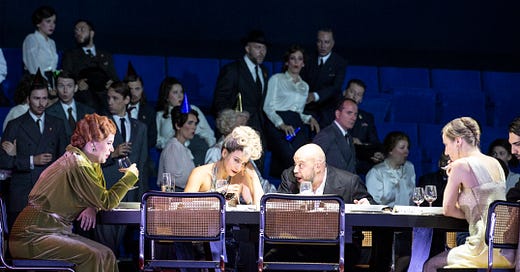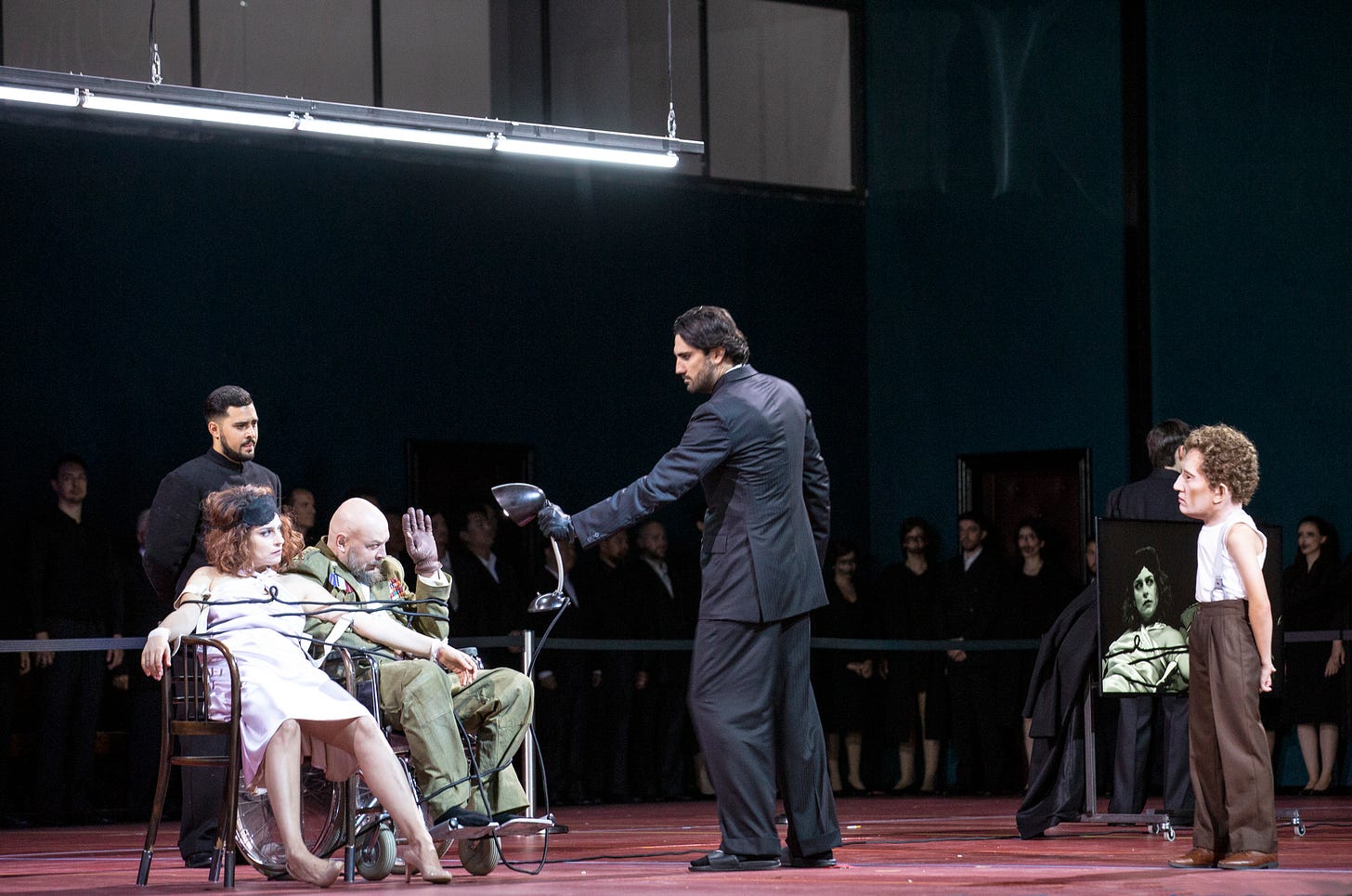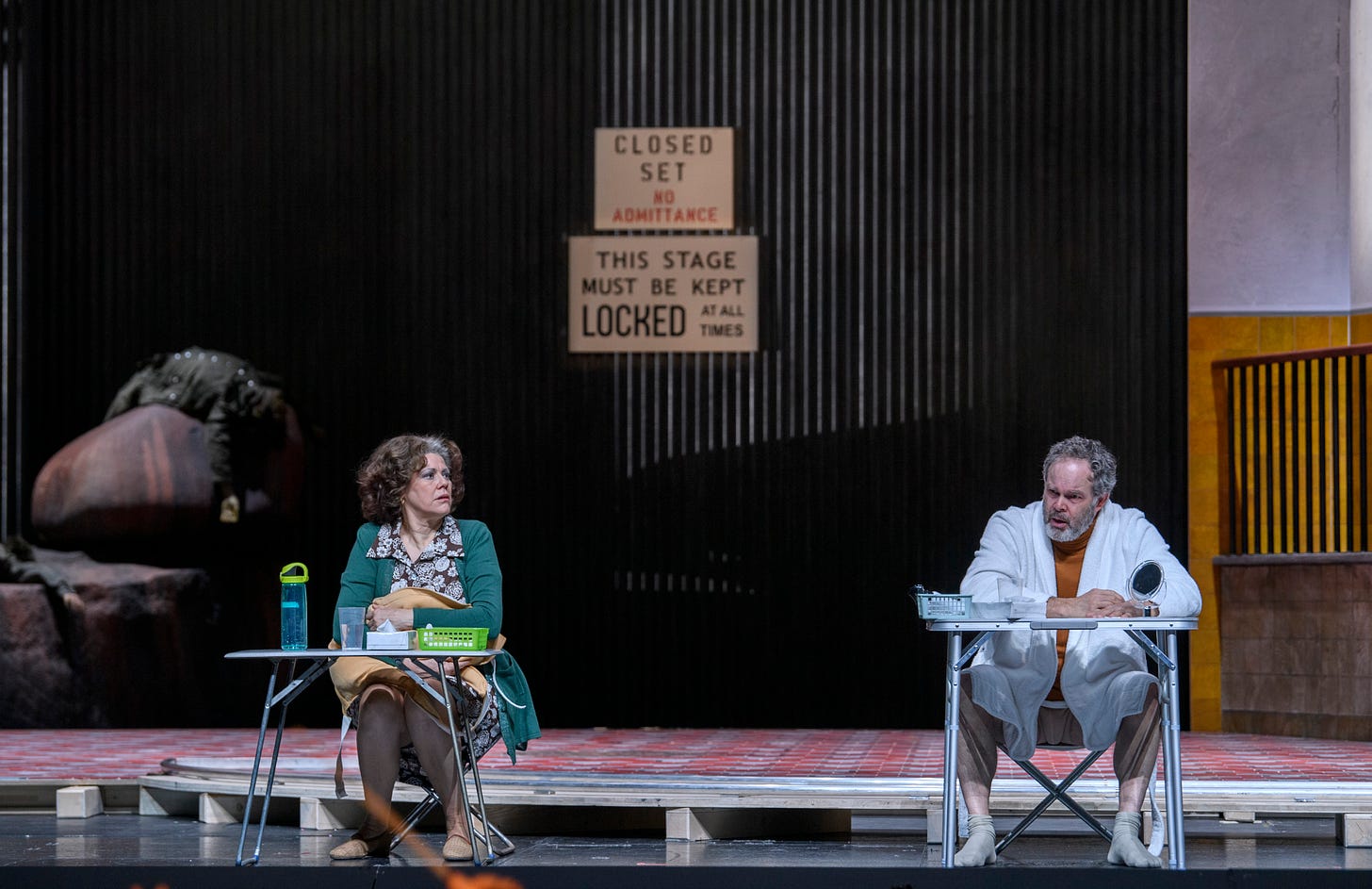Shakespeare shaken and stirred in Salzburg
Asmik Grigorian sings Lady Macbeth, Gerald Finley headlines a mirthless Falstaff
This is a slightly abridged version of a review that appears in the October issue of Opera, republished here with the kind permission of the editor, John Allison
Macbeth alla Warlikowski: Asmik Grigorian (Lady M), Vladislav Sulimsky (Macbeth) picture by Bernd Uhlig
Babies, or the lack of them, have long been a fascination for scholars and directors of Shakespeare’s Macbeth. Verdi’s librettists, Piave and Maffei, don’t mention them in their adaptations of the tragedy for his first Shakespeare opera (1847, revised 1865) but that hasn’t cramped opera directors’ style. In his visually impressive new production at the Grosses Festspielhaus, Krzysztof Warlikowski is obsessed by the Macbeths’ elusive children, almost as if childlessness somehow excused the Thane and his Lady’s homicidal ambition. Working with his regular designer Małgorzata Szczęśniak, Warlikowski presents Macbeth on a vast canvas, using every inch of the letterbox stage - a bleak, wide-open space in which Vladislav Sulimsky’s Russian oligarch Macbeth and Asmik Grigorian’s Clara-Petacci-meets-Eva-Perón Lady are introduced in the prelude sitting at either end of an elongated wooden bench. It’s a striking image of alienation, suggesting a less-than-deep sexual attachment between these power-hungry monsters. Szczęśniak’s hi-tech, wood-and-steel ambience is an apt environment for the horrors of Verdi’s opera, her witches notable for their ordinary working-class clothes in contrast to the royal couple’s fascist-era finery. Macbeth’s vision of the parade of future kings during his second scene with the witches is spine-chilling, each of them played by a child wearing a life-size head of the murdered Banquo. Two of the principals stood out: not perhaps Sulimsky’s solidly sung but un-Italianate Macbeth or Tareq Nazmi’s ear-pricking Banquo, but Grigorian’s Lady was something special indeed. She certainly coloured her essentially lyric soprano, but they were not the hellish hues one usually associates with this killer role. Her chest voice invoked ‘ministri infernali’ but she rarely sounded like a true Verdian, and the coloratura in her Act 1 cabaletta was fairly approximate. And yet she gamely produced a high D in a brilliantly acted Sleepwalking Scene, where Verdi and Grigorian finally came together in evoking sympathy for Lady M’s tormented soul. The Lithuanian soprano is a one-off, a unique singing actor of the contemporary opera stage, and she just about got away with Verdi’s anti-heroine. Her ambition is unbounded; whether she has the chops for Puccini’s Turandot (in Vienna next season) or Isolde (at Salzburg in 2025) only time will tell. The other starry performance was Jonathan Tetelman’s Macduff, luxury casting in such a secondary tenor role; but I was concerned that he is already pushing his dark-timbred instrument mercilessly.
Execution Ceaucescu style: Grigorian, Sulimsky, Jonathan Tetelman (Macduff) with child “apparition” wearing the head of Tareq Nazmi’s Banquo, far right Picture by Bernd Uhlig
The most satisfying aspect of the performance on August 24 was the singing of the Concert Association of the Vienna State Opera Chorus, the ladies rhythmically vital as the rollicking witches, the full chorus of exiles wonderfully sonorous, even if directed in concert-performance style by Warlikowski. Replacing Franz Welser-Möst (odd choice) was the Vienna Staatsoper’s departing music director, Philippe Jordan, a versatile opera conductor to be sure, but I can’t say the sometimes congested sound he got from the Vienna Philharmonic matched the transparency and elan of Riccardo Muti in Salzburg’s last Macbeths in 2011.
The conductor of Verdi’s Falstaff was Ingo Metzmacher, not an obvious choice, and the mercurial score sounded brittle and strident. I write ‘comedy’—but I spent most of the evening wondering whether the director Christoph Marthaler really thought it was one. His tired, lazy concept was to stage the opera as if it were being filmed by Orson Welles. His scenario included extra dramatis personae in Orson W. (played by the actor Marc Bodnar), Robinia, his or Falstaff’s PA (Liliana Benini) and a First Assistant Director (Joaquin Abella), who spent most of the evening attempting to upstage the characters in the opera. This is the fourth ‘let’s-make-a-film-of-an-opera’ staging I have seen this year, so it’s now more a cliché than a concept.
Tanya Ariane Baumgartner (Quickly) works her wiles on Gerald Finley (Falstaff) picture by Ruth Walz
The audience didn’t laugh. Indeed, at the penultimate performance (August 25), the entire thing did not elicit a single chuckle or snigger. There was silence after the first and second scenes, and when a small group of brave souls attempted to rouse the public after the third, they were pointedly ignored and the applause fizzled out. At the curtain, a few protestors booed, provoking counterbravos from people who rightly think it is unfair to boo performers when the director has gone.
The singers were hardly a vintage team. Gerald Finley (Falstaff) and Simon Keenlyside (Ford) both sounded their 63/64 years and tried their best not to look bored. Elena Stikhina’s full Verdian soprano was a pleasure to hear as Alice, but her singing never sparkled. Giulia Semenzato had the requisite ethereal tone for Nannetta’s exchanges with Bogdan Volkov’s nerdy, unpoetically sung Fenton, but the outstanding principal was Tanja Ariane Baumgartner’s no-nonsense Mrs Quickly: she just got on with what must have been a burdensome job, and sang her ‘Reverenzas’ with a resonant chest voice. It wasn’t her fault that no one found her shtick - or anyone else’s - remotely amusing. A write-off.






